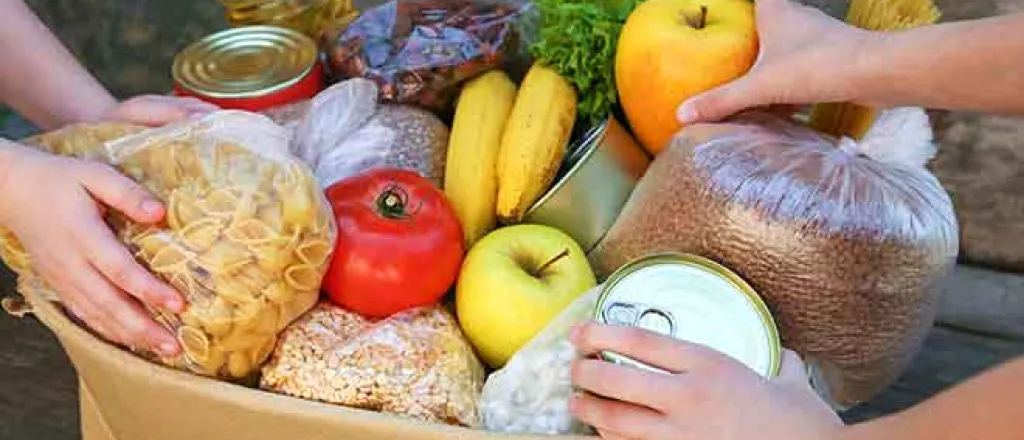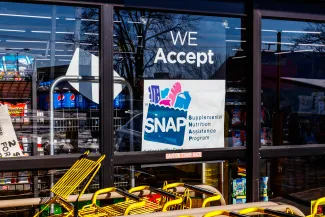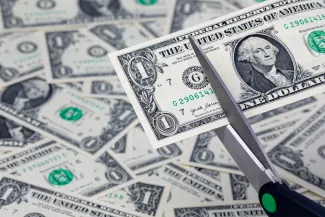
Coalition warns cuts would be 'devastating' to food assistance
Colorado Governor Jared Polis is leading a coalition urging Congress to not cut federal funding for the Supplemental Nutrition Assistance Program.
The program provides food assistance to more than one in 10 low-income Coloradans.
“SNAP is a longstanding lifeline providing basic food assistance for the most vulnerable Americans and supporting our agricultural producers, and the proposals included in H.R. 1 would both erode the fundamental infrastructure of our food safety net and transfer an unanticipated and severe financial burden to states at a time of extreme budgetary constraints,” the coalition said in a statement.
The cuts are a part of the Republican-proposed One Big Beautiful Bill Act, the budget reconciliation measure already passed by the House. As it currently stands, Colorado could lose between $200 million and $360 million annually in federal funding for SNAP.

The coalition, which includes farming, local government, state agencies and hunger groups, said the cuts would have a “severe impact.” That impact could even mean cuts for those currently enrolled in SNAP.
“As Governor Polis noted, these proposed SNAP cuts would be nothing short of devastating for communities across Colorado, especially in rural areas,” said Joël McClurg, executive director of systems for the Colorado Blueprint to End Hunger. “Already operating on shoestring budgets, many of our counties would be forced to choose between absorbing new crushing costs or slashing critical services — and either path disproportionately punishes the very people who need support the most.”
The act includes a number of significant SNAP reforms targeted at saving the federal government money, with estimates that it could save up to $239 billion.
Under the reforms, states would be required to pay for more of its administrative costs and benefit payments, upward of a 20 percent match for Colorado.
“Since its inception, SNAP benefits have been covered 100 percent by the federal government, with states only paying for benefits administration,” said a report from the Colorado Fiscal Institute. “But for the first time in history, the proposal would have states pay for a share of SNAP benefits.”

© JJ Gouin - iStock-1642293566
Monthly, approximately 617,000 Coloradans receive at least $120 million in SNAP benefits. In 2024, almost one million individual Coloradans received SNAP.
According to the coalition, SNAP also has economic benefits. It injects over $486 million into the economy in wages, supports 21,500 grocery stores that accept it, and generates $70 million in state tax revenue from enhanced local economic activity.
“Not only is SNAP a valuable program for our communities, both rural and urban, it also provides a vital market for many of our farmers and ranchers,” said Chad Franke, president of Rocky Mountain Farmers Union. “The family farmers and ranchers we represent know the value of providing local food to local communities.”
Advocates for the cuts argue they will help fix a bloated government assistance program, especially as it adds a work requirement for able-bodied adults and bans all illegal immigrants from receiving SNAP.
According to a report from the Center on Budget and Policy Priorities, only 46 percent of Colorado SNAP recipients are from “working families.”
“States are taking advantage of loopholes that allow millions of people to receive SNAP,” said Sonny Perdue, a former U.S. secretary of agriculture, in 2019. “It is my job to ensure the people who truly need food stamps receive what they’re entitled to – but the waste must stop.”
Republicans continue to be motivated by those same sentiments.
While the U.S. Senate’s version of the One Big Beautiful Bill Act does not cut SNAP as much as the U.S. House’s version, it is likely the final version will shift some portion of SNAP's financial burden to the states.
















